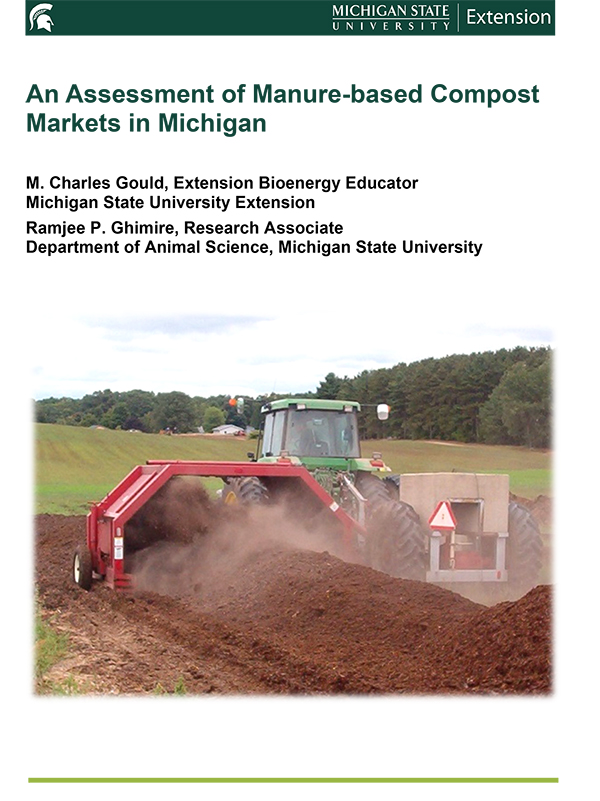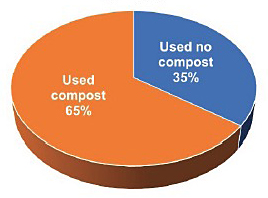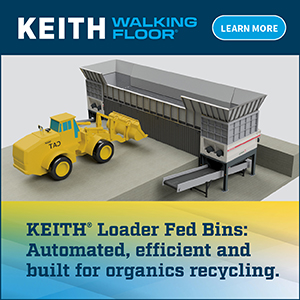Top: Photo courtesy of Brown Bear Corporation
 Michigan State University Extension (MSUE) recently released a report, “An Assessment of Manure-based Compost Markets in Michigan,” to inform farmers about demand in the state for compost made from manure and other agricultural byproducts and to help them determine if making and selling the compost can increase farm income. Written by M. Charles Gould, Extension Bioenergy Educator with MSUE, and Ramjee Ghimire, a Research Associate in the Department of Animal Science at Michigan State University, the findings are based on surveys of Michigan equine operation owners, farmers, landscapers, and nursery and greenhouse operators. The surveys differed across industries. For example, farm, landscape, and greenhouse and nursery respondents were asked questions related to their operations, preferred compost specifications, compost manufacturing and use, and demographics. The study and report update a similar effort that was conducted in 2005.
Michigan State University Extension (MSUE) recently released a report, “An Assessment of Manure-based Compost Markets in Michigan,” to inform farmers about demand in the state for compost made from manure and other agricultural byproducts and to help them determine if making and selling the compost can increase farm income. Written by M. Charles Gould, Extension Bioenergy Educator with MSUE, and Ramjee Ghimire, a Research Associate in the Department of Animal Science at Michigan State University, the findings are based on surveys of Michigan equine operation owners, farmers, landscapers, and nursery and greenhouse operators. The surveys differed across industries. For example, farm, landscape, and greenhouse and nursery respondents were asked questions related to their operations, preferred compost specifications, compost manufacturing and use, and demographics. The study and report update a similar effort that was conducted in 2005.
“The analysis of the survey data show that while farmers, landscapers, and greenhouse and nursery operators are familiar with compost, many are strongly reluctant to use it because they don’t see its value,” note the authors in the Executive Summary. “When farmers, landscapers, and greenhouse and nursery operators were asked in 2005 and 2019 whether they intended to increase compost use, the majority said no. The consistency of this response is significant because it shows that efforts to educate these audiences about producing and using compost over the past 14 years have been largely ineffective. Attitudes and perceptions toward compost across the three sectors have not changed.

Percentage of landscape operations reporting use of compost for any purpose during the growing season
“The study did uncover opportunities to change the perceived value of compost. Farmers and landscape operators indicated they would be willing to use compost that has proven and demonstrated ability to improve soil health. Farmers, landscapers, and greenhouse and nursery operators indicated they would consider using compost if its economic value could be clearly demonstrated to them. Landscapers expressed interest in composting waste materials generated in their own operations. These three opportunities provide a clear roadmap for increasing compost manufacturing and use in the state.”
Other survey findings include:
- Farmers and greenhouse and nursery operators said they were willing to pay up to $25/cubic yard (cy) while landscape operators were willing to pay between $26 and $50/cy for compost with a proven and demonstrated ability to improve soil health.
- Cost of compost production figures from four farming operations — one organic vegetable farm, one beef operation and two dairy farms — ranged from $19.39 to $34.46/cy. Given these cost of production figures and landscape firms’ and nurseries’ willingness to pay $25 to $50/cy for proven compost, it appears that use of compost could increase. Farmers appear unlikely to use more compost they have to buy; however, they may be willing to use more compost they produce from their own farm operations.
- The value of nutrients in compost could match that of some fertilizers and soil conditioners at a lower price. Furthermore, the cost of land application for a composted product may be lower and more environmentally sustainable than the direct application of manure, especially during the winter months.
Gould and Ghimire recommend action steps that could be taken to increase consumer confidence in compost’s performance as a soil amendment and increase investment in composting facilities. For example, they suggest adopting a standard set of compost specifications that enable compost manufacturers to make compost with a proven ability to consistently improve soil health; teach farmers, landscapers, and greenhouse and nursery operators how to manufacture compost that meets their soil improvement needs; work with compost manufacturers to develop compost delivery options to agricultural, landscaping, and greenhouse and nursery operations; and study the feasibility of using containers to haul manure from equine operations to central composting sites.














